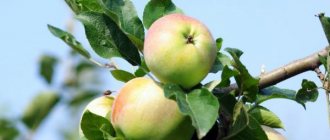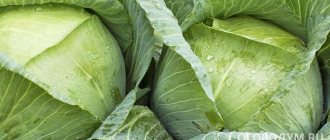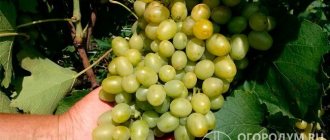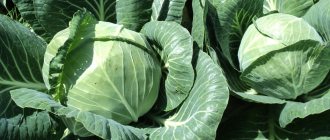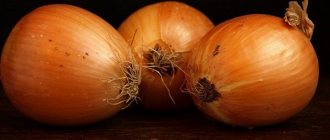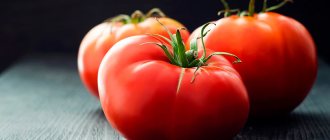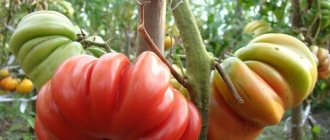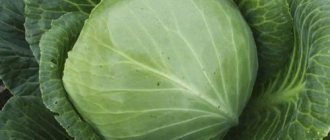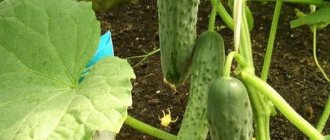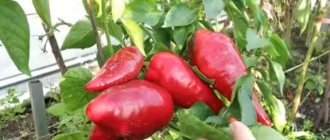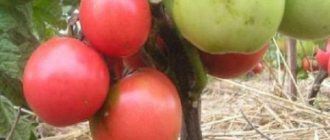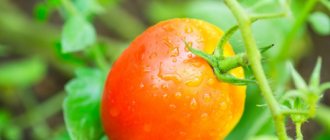Chinese women in the generally accepted sense are semi-wild, not very tasty and very small. But Bellefleur Chinese is the complete opposite, a variety with large apples that have a wonderful dessert taste. The tree is impressive, tall and spreading, producing large harvests. Fruit crops of this variety are widespread and have been cultivated for more than 100 years.
Bellefleur-Chinese apple tree variety.
Bellefleur-Chinese
The Bellefleur Chinese variety is a representative of autumn ripening, and in the southern regions it is even considered late summer. The apple tree was bred by Michurin, and he created very high-quality varieties. But the Chinese woman was present not only in the name, but also in the creation of the gene pool. The second variety whose genes were used was Bellefleur yellow. Apple trees are very large, the shoots grow downward, creating a spreading crown. The huge apples are distinctive. Their size is indicated as 300 grams, but there are even half-kilogram samples. Apples look very cute, if such a characteristic applies to fruits. Red stripes of different lengths are located in a chaotic manner along the light yellow surface.
Advantages and disadvantages
The undeniable advantages of this variety include:
- excellent commercial and consumer characteristics of the fruit;
- annual fruiting without pronounced periodicity.
But the Bellefleur-Chinese variety also has several disadvantages:
- large dimensions of the tree;
- prone to scab and powdery mildew;
- average winter hardiness;
- late entry into fruiting.
Despite the presence of significant shortcomings, the variety remains in demand in amateur gardening, since apples have a recognizable, very good taste.
Apple tree Bellefleur Bashkir
The Bellefleur Bashkir variety is the same Bellefleur Chinese, to which the genes of the local variety Bashkir handsome have been added. It began to be created already in the seventies, but has only been tested for about three decades. Their properties are almost identical, but slightly improved for cultivation in Bashkiria.
Apple tree Bellefleur Bashkir.
The apple tree is of medium height, usually grows up to 5 meters, the crown is spherical, simply huge in volume. Therefore, for planting you need to allocate a lot of space, up to 7 meters from neighboring plants. The Bellefleur Bashkir variety cannot boast of huge yields, but it can easily withstand drought and decent frosts. The shelf life of sweet fruits that have the same color is up to 5 months, and the apples are slightly smaller in size than the parent variety.
Bellefleur Chinese apple tree: description of the variety
Bellefleur Chinese apple variety: photo
The Bellefleur Chinese apple tree variety is an oldie of selection. The apple tree has been cultivated in Russian garden plots since 1908.
The seven-year-old tree began bearing fruit in 1914.
This variety was developed by Michurin I.V. by crossing the “ Large-fruited Chinese ” and “ Yellow Bellefleur ”. Thus, the breeder obtained a variety that can be cultivated in the harsh climate of Russia.
The variety became popular at an accelerated pace. They began to grow it in the Central Black Earth region, the North Caucasus, Ukraine, Armenia, and the Volga region.
Autumn ripening variety in mid-latitudes. In the south it becomes late summer.
The shoots are light brown in color with a slightly reddish tint, drooping downwards.
Large oval-shaped leaves, greenish-gray in color, wrinkled, almost curled, their edges jagged. They grow almost perpendicular to the branches.
Bellefleur Chinese apples are enlarged, slightly flattened, have ribs, weigh 200-300 g. Michurin’s fruit weight was 340 g. Young apple trees can produce fruits of 500 grams.
The stalk is medium or small in size.
The fruit is mostly light green in color. Almost half of the apple is covered with a pink-red blush. Dots of a light shade are visible under the skin.
The internal contents are very juicy, fine-grained, sweet and sour, there is a spicy aftertaste, the sourness is felt only slightly.
Characteristics of the variety
A more complete description and characteristics of the Bellefleur-Chinese variety will be presented below. As already mentioned, the main advantage will be the fruits. They are large, attractive, very sweet and aromatic. They don’t last very long, and it’s also impossible to transport them over long distances, but the fruits are universally used, so you can make many different delicious preserves, juices and dried fruits from them.
Advantages and disadvantages
This ancient variety has quite a lot of advantages. This is both unpretentiousness and amazing fruits, about which much has already been said. They are the undoubted pride of Bellefleur-Chinese.
It is worth mentioning the disadvantages. It was because of them that the variety was supplanted by younger and more promising hybrids. The resistance of the apple tree to low temperatures leaves much to be desired; the apple tree is mainly grown in the southern regions.
Immunity is average, so under normal conditions only prevention is sufficient, but under conditions of high humidity additional protection against scab and powdery mildew is necessary.
The amount of harvest is average, depending on the region it may be a little more or less. But it takes about 7 years to wait for the first fruits. Gardeners who are engaged in industrial cultivation do not really like this point.
Tree height
The Bellefleur Chinese apple tree is tall, even very tall. Without proper formation, its height can reach 10 meters. By the way, this is another drawback. It is not very easy to remove the fruit from the top.
Crown width
The volume of the crown of such a large tree is also quite impressive. The branches extend on different sides, forming a branched and dense crown. Its width can reach 6-7 meters.
Productivity
Harvest quantities vary depending on the region and growing conditions. Until adulthood, which an apple tree reaches at 12 years of age, the amount of fruit harvested from one tree is 100 kg. And in mature trees, the yield can even reach 200 kg, but at the same time the size of the fruit becomes slightly smaller.
Tasting assessment
It is not only the appearance of the remarkable apples that makes Bellefleur-Chinese so famous. Their taste is very pleasant. They have the perfect harmony of sweetness and a very light note of acidity, inherited from the Chinese. For taste, out of 5 they received 4.6 points.
Collected apple fruits.
The Bashkir subspecies is even sweeter. But since it is not distributed everywhere, there is no data on diagnostic and organoleptic indicators. The fruit has a surprisingly refreshing taste.
Winter hardiness
The variety's resistance to low temperatures is average, at least as indicated in official sources. In practice, it is grown in the south of Russia, the Caucasus, Armenia, the Lower Volga region and Ukraine. Already, even in the Central regions of the Russian Federation, the apple tree periodically freezes in the harshest winters.
Disease resistance
Bellefleur china is not the most immune apple tree and can get sick. The crown is very dense, which is a risk for fungi. Therefore, in humid conditions, scab is often observed, which seems to specially appear on large fruits.
A sign of fungal development on an apple tree.
But other diseases do not bypass the apple tree. Powdery mildew often appears here, and black cancer appears on old branches. Therefore, procedures to protect against diseases are an essential part of care.
Commercial and consumer qualities of fruits
The apples are medium or large in size, round-oval in shape, with slight ribbing in the upper part. The weight of the fruit from an adult tree is usually 200-220 g, from a young tree - up to 300 g . In some cases, the weight of one apple can exceed 500-600 g . Many gardeners grow Bellefleur Chinese because of their interest in the size of its fruits.
At the All-Union Exhibition of Breeding Achievements in 1934, dedicated to the 80th anniversary of I.V. Michurin, the fruits of “Bellefleur-Chinese” were recognized as the largest and most beautiful
The main color of the skin at the time of ripeness of the fruit is light yellow, sometimes with a green tint. As the apples ripen, it turns white. The top color consists of streaks of carmine color over a diffuse light pink blush on the smaller part of the fruit.
The funnel is narrow and deep, sometimes partially rusty, the stalk is short. The saucer is wide, with smooth walls. The cup is small and closed.
The external attractiveness of the fruit is rated 4.7 points (out of 5)
The pulp is white, juicy, fine-grained, aromatic, with a pleasant sweet taste and light spicy sourness. Professional tasters of the State Register highly rated the taste of apples at 4.7 points out of 5 . The fruits are of dessert quality, so they are primarily eaten fresh or used for preparing fruit salads, baking fillings, jam, and compotes.
According to biochemical analysis, the pulp of fruits grown in the Oryol region contains:
| Nutrients and beneficial substances | Quantity per 100 g of product |
| Vitamin C (ascorbic acid) | 7-8 mg |
| Sahara | 11.2 g |
| Acids | 0.7 g |
The excellent taste of Bellefleur-Chinese apples is determined by the relatively high content of sugars and low acids. The sugar acid index (SAI) is 16, which indicates their perfectly balanced ratio.
Harvest and storage
The harvest period depends on the climatic characteristics of the region where the apple tree is grown and occurs at the end of August in the southern regions or the second or third ten days of September in areas with a cooler climate.
During the ripening process, apples do not fall off the branches and hang firmly on them until harvesting, despite their large size and weight
The fruits reach consumer ripeness approximately 15-20 days after harvest. They need to sit for a bit so that the taste becomes more balanced and develops fully.
Apples of this variety cannot boast of high keeping quality: their shelf life usually does not exceed two months (until the beginning of December) . After this, the consumer qualities of the fruit deteriorate - they begin to quickly deteriorate, the pulp becomes mealy.
Apples should be stored in a dry, well-ventilated, dark and cool room, separate from other vegetables and fruits. They need to be sorted and placed in wooden or cardboard boxes, having first wrapped each fruit in paper or layered with straw.
When stored in a refrigerator (at a temperature of 0 ° C), fruits can last until January. Thanks to their durable skin, the fruits tolerate transportation well; even after long-term transportation they do not lose their presentation.
Features of planting and care
The requirements for planting the Bellefleur Chinese and Bellefleur Bashkir varieties are identical, so we will talk about the characteristics and preferences of both of these related varieties.
Landing
There are two important requirements that must be taken into account: choosing the right seedling and location. Planting material must be purchased from trusted sellers and inspected for damage and exposure to pests. Before placing the seedling in the ground, the roots must be soaked in water for a day.
The landing site must be chosen carefully. It should be well lit and protected from strong wind gusts. It is necessary to choose a place on the site where groundwater is located as far as possible. The soil should be fertile and light. Loamy or sandy loam is best.
Apple tree planting diagram.
Deadlines
The exact planting date can only be determined based on the characteristics of the climate and region. But if we are talking about planting in the spring, then you need to choose a time after the soil has warmed up, but before the buds open. In autumn, planting should be done after the leaves from other apple trees have already fallen, but so that there are about 25 days left before the first frost. This is the end of April and the end of September respectively.
Technology
Landing is carried out according to one standard algorithm:
- Prepare the planting hole in advance and add organic and mineral fertilizers to it.
- In the center you need to make a mound of fertile soil and plant a seedling on it.
- Spread the roots well, cover with soil and water.
- Immediately mulch the tree trunk circle.
It is best to tie the seedling to a support, and the neck of the root must be above the ground level.
Distance
Taking into account the impressive size of the crown and height of the apple tree, it is necessary to properly maintain a distance from neighboring trees. It should be about 5 meters minimum. But you also need to understand that the variety is not self-fertile and needs pollinators, which should be located at a distance of up to 50 meters.
Scheme of distances when planting an apple tree.
Features of cultivation
If you once again pay attention to a number of disadvantages of the variety and its weak points, you can easily determine the characteristics of growing an apple tree. It is necessary to pay attention to the condition of the crown, protection of the apple tree from pests and diseases, and regular pruning.
Agricultural technology
Following proper care conditions will help increase the amount of fruit and improve immunity.
Correct agricultural practices include:
- pruning and crown formation;
- preventive spraying with fungicides and insecticides;
- timely application of fertilizers during the season;
- timely watering of the tree;
- cleaning, loosening and mulching the tree trunk circle;
- protection of the trunk of young apple trees from rodents and low temperatures.
All these requirements are standard and apply when caring for any varieties of apple trees.
Pruning and crown formation
It is very important to begin the formation of the crown from the second year after planting. The Bellefleur Chinese apple tree is prone to thickening and growing too high, so it is very important not to neglect these procedures. A properly formed crown will help avoid many problems.
Proper pruning of an apple tree.
Pruning should be done for the first time in the second year of the apple tree’s life. The best time for this would be spring, before the buds open. It is better to create a rarefied form so that air passes well between the shoots and circulates freely.
You need to cut off wounded, frozen and broken shoots. It is also necessary to remove duplicate and top branches that grow inward and interfere with the full development of other shoots. Large cuts should be covered with garden varnish or oil paint to prevent infection from entering the apple tree tissue.
Breeding methods
One of the easiest ways to propagate the Bellefleur-Chinese apple tree variety is to grow it on a seed rootstock. The procedure is quite lengthy, requires a lot of preparation and a lot of time.
There is one very simple way to grow this variety, but at the same time make it more resistant. Bellefleur can be grafted onto various frost-resistant, medium-sized rootstocks. This can improve stability and reduce growth.
Diseases and pests
The main damage to Bellefleur Bashkir is caused by:
Apple codling moth (caterpillars damage fruits and contribute to large drops). To get rid of the codling moth, double spraying with a solution of Parisian greens (strong poison) in proportions of 100 g per 16 buckets of water is carried out immediately after flowering and in early June, when the ovary has reached the size of a hazelnut.
Apple aphid. Destroyed with a solution of 200 g of crushed laundry soap per bucket of warm water with the addition of one glass of thick tobacco decoction (shag), a quarter glass of kerosene, ground with a half glass of wood ash. It is advisable to dip infected branches into a bowl of mixture or treat them with a sponge or large brush.
Scab, a fungal disease, appears as a grayish-greenish coating on the wrinkled bark of a tree. It is removed by spraying diseased trunks with 2% Bordeaux mixture in early spring. Treatment should occur before buds develop and shoots appear.
It is also worth taking measures against fruit sapwood, leafmining moths, hawthorns and silkworms.
Growing a good harvest of apples is a gardener's dream. It becomes real if you plant good varieties of fruit trees. Bellefleur Bashkir is one of these.
Its advantages are excellent taste (sweet), average frost resistance, high yield, good transportability and shelf life.
Features of ripening and fruiting
There are a number of features in fruiting that need to be taken into account. Some of them are off-putting to gardeners.
Beginning of fruiting
To get the first apples, you need to be patient. They can only be tried in 6-7 years. But this is not always the case. When planting an annual seedling in autumn, the first apples can be harvested only after 8 years.
Flowering time
The Bellefleur Bashkir apple tree variety blooms in the same way as the Bellefleur-Chinese apple tree variety - in May. Although many other apple trees bloom at this time. This is very convenient, because at the same time many of those varieties that are pollinators bloom.
Apple tree in bloom.
Fruit ripening
Usually the fruits are ready for picking at the beginning of September, in some places up to half the month. For storage, apples must be picked at the moment of ripening. But you can leave a small amount of fruit for eating. The fruits stay tightly on the apple tree until the coldest weather.
Fruit storage
The taste of the fruit can be preserved under the right conditions until December, in rare cases even until the New Year.
Features of fruiting
Apple harvesting takes place on last year's shoots and fruit twigs. The collection can be carried out every year without exception. An adult apple tree, over 20 years old, becomes even more productive.
Collection and storage
Bellefleur Chinese women collect apples in September. The fruits do not fall off, which allows you to pick them intact directly from the branches. Store apples in a cellar or basement at temperatures from 0 to 10 ° C and humidity up to 70%. It is advisable to place them separately from vegetables and other fruits so that they do not lose their flavor. In the cold, apples can last until December at most.
It is advisable to store apples in shallow boxes, laid in one layer.
Growing in regions
The peculiarities do not allow one to grow an apple tree everywhere, no matter how much one would like it. The variety is widespread in Armenia, the Caucasus and Ukraine. In the southern part of Russia only.
Moscow region
In the Moscow region, growing the variety is possible, but it is only better on a frost-resistant and semi-dwarf rootstock. But the fruits here do not gain maximum sweetness.
In the Urals
In this region, the Bashkir subspecies is more common, which is slightly more resistant. And not everywhere, but only in warmer parts.
What type does it belong to?
Bellefleur-Chinese is a variety of apple tree in the middle regions of the southern zone of the European part of Russia.
In the middle zone it is classified as an autumn variety , in the south - a late summer variety.
Bred by Michurin himself , this apple tree was once very popular and widespread in our gardens.
Unfortunately, it could not withstand competition with new varieties that were more resistant to cold and disease.
Check out other autumn varieties of apple trees: Aelita, Gala, Lyubava.
Reviews
Mikhail, 48 years old, Bashkiria: “I received an apple tree in addition to the dacha, I didn’t choose it myself. I won’t say anything bad, I won’t over-praise either, everything is fine, but nothing special. True, it looks unusual, such a big tree, and there are only a few fruits here and there.”
Semyon, 50 years old, Salavat: “Chinese Bellefleur was chosen on the market by chance, there were no special requirements. They waited so long for the first fruits that they already wanted to cut them down. But no, fruiting has begun. The apples are very large and tasty, the whole family is happy. But the tree is capricious: sometimes it gets sick, sometimes it freezes, and it’s very big.”
Nadezhda Stepanovna, 62 years old, Lugansk: “I don’t even remember how old our beauty is on the site. There are enough apples to eat fresh and make compotes. Our tree did not freeze, but in the cold year in the summer it suffered from scab, so much so that all the fruits were beaten.”
Bellefleur Chinese apple tree: reviews of the variety
Liliya Genrikhovna L .: “No one knows how many years the apple tree has been growing in our garden plot. More than 40 years exactly. We call the tree Bellefleur, Chinese, Michurinka. The apple tree is huge in size. Because they have been circumcised many times for rejuvenation. The fruits are small but tasty. The tree bears fruit annually. There is no special need to care for the apple tree. However, as with all apple trees. We will not give up this apple tree, despite the fact that there are other apple trees growing in our garden. They advised to graft the seedling onto a frost-resistant variety. But our apple tree tolerates the winter well even without this.”
Alexey Stepanovich L .: “A large number of apple tree species grow in our garden plot. Of the autumn varieties, I love Bellefleur Chinese. We purchased it after looking at the photos and studying the specifications. I like the variety for its size and fruits, which have excellent taste. Especially after short storage. Apples after “White filling”. We make juices and jams. Fruits don't last very long. We have many winter-ripening apple tree species. For some time I did not treat the tree against scab. Over the course of 4 years, I corrected this oversight. Treated with urea and copper sulfate.”
Valentina Petrovna D .: “Most people are unfamiliar with the apple variety “Bashkir Bellefleur.” It is the most common among us. Perfectly adapted for cultivation in our climate. It is necessary to treat against harmful insects and diseases. There were cases of freezing. But the apple tree produces fruits annually and in large quantities. I didn't weigh it, though. I don't like this thing. Apples tolerate storage well. After the New Year holidays we still eat fruit. Good quality. One thing is interesting: the variety was bred in the 30s, but recommended for cultivation only in the 90s...”
Sergey Aleksandrovich Ch .: “I didn’t plant this apple tree myself. I grew up on a summer cottage that I purchased. I found out that it was Bellefleur. As for the fact that this is “Bashkir Bellefleur”, I understood from the characteristics and photographs. I wanted to change it to other varieties. The hand did not rise. I want to try to vaccinate, and then we’ll see. But I want to instill “Chinese” rather than “Bashkir”. Because I like the size of this variety. It’s not for nothing that the apple tree has been very popular for such a long time and over vast areas. But I would correct immunity to diseases. It’s not for nothing that the variety is called a souvenir variety. And he takes part in exhibitions...”
Productivity
Excellent yield ( 50-80 kg per tree ) and good keeping quality and transportability of fruits have become one of the conditions for the commercial distribution of this apple variety.
The apples are held quite firmly on the branches and can withstand strong winds without falling prematurely. Fruit harvesting from September, excellent preservation until February.
The following apple varieties can also guarantee high yields: Lobo, Antey, Lyubava, Kuibyshevskoye and Imrus.
Features of growing Bashkir Bellefleur
Landing
Basic conditions
Disembarkation dates
For Bellefleur Bashkir, both spring and autumn planting options are acceptable. The main thing is that at the time of planting there is no or no movement of sap in the trunks. They usually choose a warm day at the end of March or April, and as an option - at the end of September or October, when there is no threat of frost.
Tree care
Protection from frost and pests
Before wintering, you need to carefully cover the trees so that they do not get damaged, especially when it comes to young trunks. It is good to throw straw, hay, and mats of dry leaves over the roots. The trunks are wrapped with any available materials from roofing felt to old ladies' tights. Young seedlings can be wrapped using the tent method.
Timely preventive treatment helps against pests and diseases. Industrial production means can be easily found in stores for farmers. But at the same time, you can whitewash the trunks with lime to prevent insects, and also treat them with rendered lard or grease to prevent rodents.
Loosening the soil, watering: proper agricultural technology
They dig at the trunks twice a year, and sometimes just one is enough for older trees. It is advisable to do this during a period when there is no juice flow, so that the apple trees receive less stress. The shovel is deepened no more than half the bayonet of the shovel, because some of the shoots pass directly to the surface. During the growth process, you can hoe the soil, lightly fluffing it with a squeegee; it is especially important to do this the next day after watering.
Seedlings at a young age will have to be watered regularly; they will need at least 15-25 liters per tree in 10-16 days, depending on the site, soil, weather and climate in general. Adult boles can be watered 5-6 times per season, timed to coincide with flowering, ovary formation, and fruit ripening. For convenience, you can dilute fertilizers with water and apply them along the projection of the crown perimeter.
Pruning: simple crown formation
One- or two-year-old seedlings usually arrive from nurseries already formed, and most often they are tiered, sparsely tiered or oval in shape. This way the branches will be located far from each other, creating the correct “backbone” of the tree. In the future, you will just need to maintain the correct branching and not let the trees become overgrown.
All broken and dry shoots are also cut off in the fall. Those who are sick should be removed immediately to prevent the disease from spreading to others. Remove thickening branches that stick up, grow parallel or inside the crown, all this will interfere with good fruiting.
Source
History of selection
The famous ancestors of the new hybrid are the Bashkir beauty and the hybrid from the gardens of the great breeder I. Michurin - Bellefleur Chinese.
Varietal breeding took place in 1938 , thanks to Raisa Ippolitovna Bolotina .
She worked at the Bashkir Research Institute of Agriculture and, together with her colleagues, developed many wonderful varieties of apple trees, pears and currants.
The Bashkir Bellefleur variety was taken seriously only in 1991, and now it is widely known and often found in collective gardens of the Soviet era.
